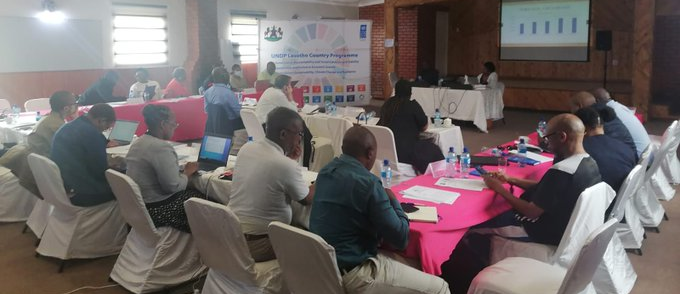National Reforms Transitional Office
The Ministry of Justice and Law through the National Reforms Transitional Office (NRTO) and in collaboration with the United Nations Development Program (UNDP) held a Security Sector Expenditure Review workshop at the Molengoane Lodge in Maseru from the 17th to the 21st of October 2022.
The workshop was preceded by a high-level briefing to Security Chiefs from all the security agencies conducted by the NRTO and the UNDP in Maseru on 22 September 2022 at which the security chiefs endorsed the Expenditure Review process.
The briefing was attended by high level teams from the security sector agencies led by Lieutenant General Mojalefa Letsoela, Commander of the Lesotho Defence Force (LDF) and Chief of Staff, Commissioner of Lesotho Mounted Police Service (LMPS), Holomo Molibeli, Mr. Pheello Ralenkaoane, Director-General of National Security Service (NSS) and Mr Motingoe Phamotse, Deputy Commissioner of Lesotho Correctional Services (LCS).
The purpose of the workshop was to examine budgetary institutions and processes in the security sector of the Kingdom of Lesotho.
It was aimed looking at the extent to which the budgetary institutions and processes in the security sector promote fiscal discipline, efficiency, effectiveness and equity over the period 2017 to 2022.
It was further intended to determine whether these institutions are in line with the policy priorities specified in Key Priority Area No. 4 of the National Strategic Development Plan II (2018/19 – 2022/23) which is, “Strengthening National Governance and Accountability Systems”.
The workshop was part of the ongoing national reforms process and it was done under the Lesotho-UN National Security Sector Reforms for Peacebuilding Project (NSSRPP) signed in November 2020.
The Multi-stakeholder National Dialogue Plenary II Report, which is the main reference for the implementation of the national reforms lists Public Expenditure Reviews as one of the main tenets of the country’s fiscal consolidation strategy for the maintenance of macroeconomic stability.
Although Public Expenditure Reviews have been held by the Ministry of Finance for a long time, this is the first Expenditure Review that covers the whole of the security sector.
The workshop was attended by more than 30 participants, and it was officially opened by the Principal Secretary for Justice and Law, Mr. Retšelisitsoe Mohale.
The Deputy Resident Representative of the UNDP Ms. Nessie Golakai-Gould and the World Bank Expert on Public Expenditure Reviews Mr. Francisco Vazquez Ahued.It addressed the workshop.
Activities for the review were done over a period of 2 months with background information on Public Expenditure Reviews and the macroeconomic trends being sourced from the World Bank, from the Secretariat of Lesotho’s National Assembly and from the Central Bank of Lesotho.
The Security Sector Expert for the UNDP Mr. John Symons and the Security Sector Reforms Advisor for the National Reforms Transitional Office Dr. Norman Mlambo facilitated the workshop.
Participants at the workshop were drawn from the Office of the Prime Minister, the Ministry of Justice and Law and the Ministry of Defence and National Security. Representatives also came from the Ministry of Police and Public Safety, the Ministry of Finance, Lesotho Defence Force (LDF) and Lesotho Mounted Police Service (LMPS). Participants further came from the National Security Service (NSS), Lesotho Correctional Service (LCS), and UN Office of the High Commission on Human Rights (OHCHR).
The main discussions at the workshop centered on how to increase the economy, efficiency and effectiveness of security expenditures, and identify the potential for saving and also how to improve existing financial practices in order to move faster with the ongoing security sector reforms.
The discussions also featured how to rationalise current spending in the security sector, eliminating waste and unnecessary duplication also how to promote transparency, integrity and accountability in the budget formulation and execution process as necessary conditions to ensure efficiency and equity.
Participants further pondered on modalities to determine whether the current security structures and their levels of spending are sustainable and cost effective for the national purse.
They also discussed ways in which the security agencies could determine the strategic structures necessary for the implementation of security sector reforms, and estimate the costs for the establishment of such structures.
Participants were also introduced to ways in which they could inform partners and prospective donors who may choose to fund the security sector component of Lesotho’s national reforms process going forward.
The workshop’s main deliverable is a comprehensive report indicating the presentations and the views expressed by the participants, and the relevant recommendations on financial management for the security sector that the Basotho Want.


